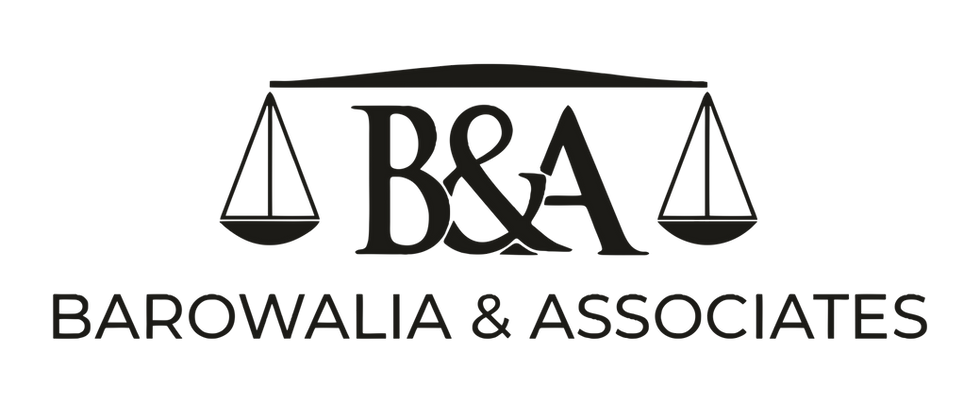Copyright and Creativity: Protecting Musicians Under Indian IP Law
- Barowalia & Associates
- Jun 21
- 4 min read
On World Music Day, we celebrate not only the power of rhythm and melody but also the tireless work of those who compose, perform, and share music with the world. Music transcends boundaries—it connects cultures, emotions, and generations. Yet, behind every piece of music lies the creator’s intellectual effort, emotional investment, and artistic integrity. It is essential that the legal system upholds these contributions through effective intellectual property (IP) protections.
In India, copyright law plays a critical role in protecting musicians, composers, lyricists, and producers. Understanding these protections is not just important for artists—but also for producers, music labels, streaming platforms, and event organizers. On this World Music Day, let us explore how copyright law empowers musicians, what rights they possess, and how they can enforce these rights if violated.
🎵 What Is Copyright in Music?
Copyright is a legal right granted to the creator of original works, including musical compositions, lyrics, sound recordings, and performances. Under the Copyright Act, 1957 (as amended), copyright gives the creator exclusive rights to:
Reproduce the work
Distribute or publish it
Perform it in public
Make adaptations or translations
License it to others
Prevent unauthorized use
In music, different elements receive distinct protection:
Element | Protected As |
Lyrics | Literary work |
Musical composition | Musical work |
Sound recording | Sound recording (separate work) |
Vocal/instrumental performance | Performer’s right |
🧑🎤 Who Owns the Copyright in Music?
Ownership in music depends on who created which part and the terms of any agreement involved:
The lyricist owns the literary copyright in the lyrics
The composer owns the musical composition
The producer or record label usually owns the sound recording
The performer (singer/musician) has performer’s rights under Section 38
In case of employment or contractual work, copyright may vest in the employer or commissioning party
It is common for music labels to contractually acquire the rights from creators—but creators must negotiate these agreements carefully.
🎶 Duration of Copyright
Different works have different copyright durations:
Literary and musical works: Lifetime of author + 60 years
Sound recordings: 60 years from publication
Performer's rights: 50 years from the date of performance
After expiry, the work enters the public domain and can be used freely.
📜 Registration of Copyright
Copyright in India exists automatically upon creation of an original work. However, registration under the Copyright Office (Ministry of Commerce & Industry) offers benefits such as:
Legal evidence of ownership
Easier enforcement in case of infringement
Public record of the work
Better licensing and commercial value
Registration involves submitting an application with details of the work, a copy of the music or lyrics, and applicable fees.
🔐 Exclusive Rights of the Creator
The Copyright Act provides creators with several exclusive rights, including:
Reproduction: Only the copyright holder can copy or reproduce the music.
Public performance: Playing music in concerts, clubs, events, etc., needs permission or license.
Communication to the public: Playing music on radio, TV, streaming apps.
Adaptation: Remixing, reworking, or translating the lyrics.
Moral rights: Right to be credited and to object to distortion of the work.
⚖️ Remedies Against Infringement
If someone uses your copyrighted music without permission, it is known as infringement. The creator has the following legal remedies:
1. Civil Remedies
Injunction to stop the unauthorized use
Damages or account of profits
Delivery of infringing copies
2. Criminal Remedies
Imprisonment up to 3 years
Fine up to ₹2 lakh
Seizure of infringing materials
3. Administrative Remedies
Blocking of infringing websites (by court order)
Complaints to YouTube, Spotify, etc. under their content policy
💼 Licensing and Royalties
Creators can license their music for various uses—films, events, advertisements, radio, and digital platforms. Licensing may be:
Exclusive or non-exclusive
Territorial (limited to a country) or worldwide
For a fixed term or in perpetuity
Creators can also sign up with copyright societies like:
IPRS (Indian Performing Right Society) for composers, authors
PPL (Phonographic Performance Ltd.) for record labels
These bodies collect and distribute royalties on behalf of members whenever their music is publicly played or broadcast.
🎧 Streaming and Digital Challenges
In the age of Spotify, YouTube, Instagram reels, and online radio, copyright enforcement is complex:
Platforms often require users to upload only original content
Music used in videos without licensing may lead to takedowns
Creators must be aware of Content ID systems and DMCA notices
Indian law is catching up, but creators must also be proactive in monitoring and asserting their rights online.
📚 Important Judgments on Music Copyright
Indian Performing Right Society v. Aditya Pandey (2012)– Held that composers and lyricists retain rights even after assigning recording rights.
Super Cassettes Industries Ltd. v. Myspace Inc. (2011)– Ruled on intermediary liability for music uploaded on digital platforms.
Phonographic Performance Ltd. v. Lookpart Exhibitions (2016)– Affirmed that commercial use of music requires license from the rights holder.
These cases show how courts are actively protecting the rights of music creators in India.
👨⚖️ Why Barowalia & Associates Advocates for Strong Music IP Rights
At Barowalia & Associates, we believe that art and law must work together to build a creative, fair, and respectful society. Our legal services include:
Drafting and reviewing music contracts
Advising on copyright registration
Representing artists in IP disputes
Licensing, royalty, and assignment agreements
Helping musicians enforce their rights against infringement
We support the rights of composers, singers, producers, and digital creators in Himachal Pradesh and across India.
In a world where music is shared instantly and globally, protecting creative rights is not a luxury—it is a necessity. We are committed to ensuring that artists are respected not only for their talent but for their legal ownership over their art.
Disclaimer: For information only; AI Assisted; no liability whatsoever.

Comments